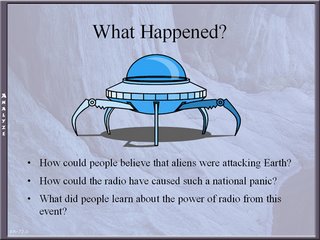Lonelygirl15: Orson Welles Would Have Been Proud

I was speaking with a student worker yesterday who was editing PowerPoint lessons another student worker and I had produced about the role of radio in the 1930s and the impact of Orson Welles' 1938 adaptation of H.G. Wells' War of the Worlds on audiences. She was having difficulty appreciating how frustrating it was for people who took the radio broadcast at face value (in fact, most of those who thought the world was really being attacked by Martians had tuned in after the end of a competing program on another station, and missed the disclaimer that opened WOTW) and I came up with the lonelygirl15 videoblogs as an analogous example. The more I thought about it, the better it fit.
Both instances were works of art/entertainment designed to exploit the inherent trust consumers of the media format had in a popular and seemingly transparent genre. In the case of Welles, this meant producing the radio play in a strict news reporting format, complete with interruptions of regularly scheduled programming, emergency announcements, and bits of messy confusion and static. The creators of the three-month series of lonelygirl15 videos took advantage of the intrinsic honesty viewers assume is behind every webcam videoblog by exploiting all of the conventions of the medium - the teenage confessor, the yawningly slow and thus tantalizing storyline, the non sequiters and general dawdling around. As with War of the Worlds, audiences were largely angered and disgusted when they learned that they had been fooled by their belief in a genre's universal sincerity.
Welles took great interest in this kind of media deconstruction, and returned to it repeatedly throughout his career. He playfully used a spot-on, if slightly too pretty, simulacrum of film newsreels as the opening for Citizen Kane, and later genuinely fooled at least one audience member (me) by perpetrating a fraud in his brilliant half-documentary F for Fake, one of my favorite movies of all time.
In a sense, he invented a genre in violating the audience's trust in popular media. Many suspect as being intrinsic to popular culture, but I believe it is only present when some compelling interest (king, president, or corporation) works very hard to develop that trust so as to have an open and pliable audience for its messages. I haven't watched more than a handful of the lonelygirl15 videos, but the project seems like a worthy successor in that it made a very big splash in unmasking a naively trusting media environment and thus educating media consumers in a very direct way. Artists in this role, while they may aggravate and ultimately betray their audiences, play a very important and clearly functional role in media literacy. To call this a violation of ethics is to grossly misunderstand their cultural significance.
The new twist not present in other notable attempts to violate viewer trust in recent years - the viral, mythmaking hype surrounding The Blair Witch Project, for example - is that the pranksters found a truly naive audience waiting to be educated. Citizen Kane's "News On The March" was not just an effective and engaging way to open Welles' first film; it was an explicit reference to the reputation he forged as a maverick out of what could have been a disastrous public reaction to his work, and it acknowledged that Welles had already created a new media world from which there was no return. Most of us think we know already what millions of twelve- to eighteen-year-olds just found out, and can thus watch or ignore ABC's 9/11 "docudrama" without batting an eye at the use of the term to describe a work that is largely fictitious. We suspend disbelief to enjoy the show or hold it at arm's length because we know something stinks, but we don't engage with it on the level that radio listeners did with their evening programming in 1938 - or on the level that teens making their own videoblogs did with the blogs of their peers prior to lonelygirl15's unmasking as the actress Jessica Rose by the son of a Silicon Valley blogger. In this case, however, audiences have the power to respond - as is witnessed by the hundreds of videoblog entries that condemn, discuss, praise, or mock the entire episode. Radio listeners never had it so good.







No comments:
Post a Comment